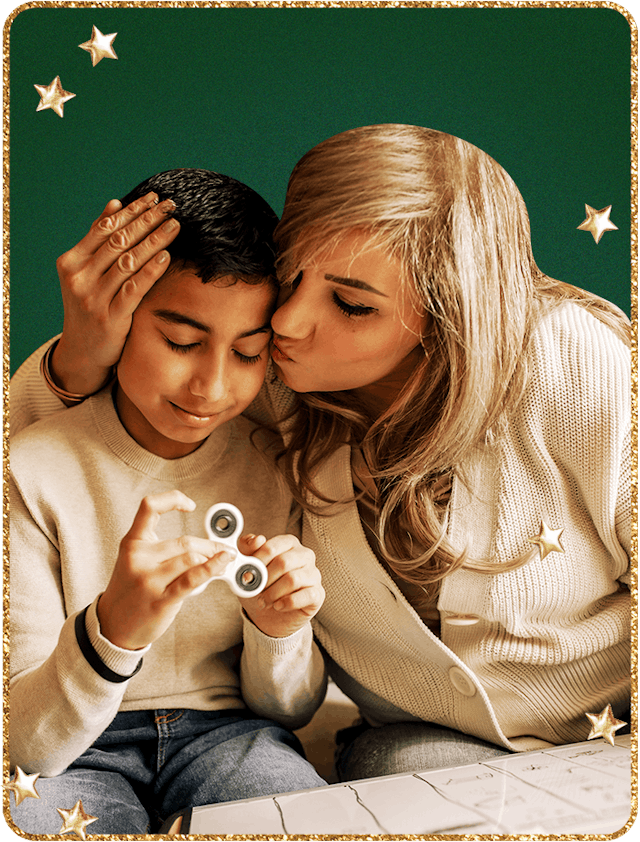Please Be Kind To Your Relatives With Autism This Holiday Season
Let the autistic family member be autistic. There is no greater gift.

I had a great-uncle growing up who absolutely loved to put on two-plus-hour-long piano recitals and to narrate various sketches he had drawn specifically to share with us around the holidays. I dreaded those hours. I just wanted to run around with my cousins or get lost in the 30th re-run of A Christmas Story. This particular great-uncle could not “read the room,” as you’d say. I come from a large family and there was not a single smile on any of the great-grandkids’ faces. There were whispers to mom and dad, “Is it almost over?” There were glaring looks from mom and dad, sending the message that we better not so much as peep until our great-uncle was done.
Now, I want to give my young self and my cousins grace. It’s difficult for the majority of children to sit still for such a long time, especially around the holidays when you’re loaded with red and green sugar. As an autistic myself and with over a decade of experience working with autistic individuals as a speech and language pathologist, in hindsight, I would say that great-uncle of mine was likely autistic. His special interest was the arts and he tended to only interact with family when he was doing exactly what he loved.
I applaud my own mom and dad for having me sit there, but also reflecting on this experience, I could have enjoyed the performance more as a child if I would have understood that neurodivergence exists and that there are accommodations that can be made to show understanding and to make them feel welcomed.
And that’s how I think it often is for autistic children and adults around the holidays — they can be misunderstood and not accommodated by people who love them. So many of those “memorable holiday experiences,” whether that’s spending time building a gingerbread house or watching a family member perform, can be stressful for those of us with a different neurology — with an autistic brain. I want to emphasize that it’s not intentional, but I do want to say the time is now to become aware and to make a few changes to make this time of year a time of true thanks, true giving and true merriment.
For starters, recognize that the best thing you can do is chat with the autistic family member or their parent to determine what would make them or their autistic child feel seen, welcomed, and comfortable. Do they need a quiet room to retreat to as their safe space and to feel grounded? There are so many senses (taste, smell, sight, noise, interoception and texture/touch) at work at a holiday gathering that can be a lot for a neurodivergent brain to process. Sensory processing differences are common in autistic individuals. Things can either be a bit too much or perhaps not enough. You couple this with extra effort of reading social cues, and it’s no surprise exhaustion happens and the need for a place to escape is a perfect accommodation.
How about what’s on the menu? A big thing — for me and some of my patients — is familiarity and comfort. So if your autistic niece isn’t used to holiday ham, it might throw her off. Suggest instead that the parent or autistic person bring a preferred dish.And what about gifts? Again, familiarity is key. So if your autistic nephew likes Doritos, grab a big ole bag at Costco and put a bow on it. If she passes by the Doritos, it does not mean she is not happy about them, there could simply be too much going on at the holiday gathering and she is trying to process it all. Don’t take it personally!
This leads me to the ultimate accommodation: Let the autistic family member be autistic. There is no greater gift. It’s too easy to think all family members should abide by neurotypical (common brain neurology) mannerisms such as sitting still at the Thanksgiving table or saying “thank you” after receiving gifts. Don’t negatively judge what you see. Instead, get curious and ask questions to gain understanding. By doing so, you’re literally sending the message that they are loved and welcomed, free to be themselves, and if their parents are there, they’ll too feel at ease and be able to enjoy the holiday gathering.
These are simply a starting place for creating the most memorable holidays for the ENTIRE family. Be gracious with yourself as you learn. Be proud you’re giving a damn about all of this. It’s far time autistic family members be given the gift of accommodation and acceptance — no bow or bag required!
Meg Raby is a mom, children's author of the My Brother Otto series, and Autistic residing in Salt Lake City where you can find her playing and working with neurodivergent children as a Speech Language Pathologist and friend, or writing and planning big things in the second booth at her local coffee shop that overlooks the Wasatch Mountains while sipping on her Americano. Meg believes the essence of life is to understand, love and welcome others (aka, to give a damn about humans).